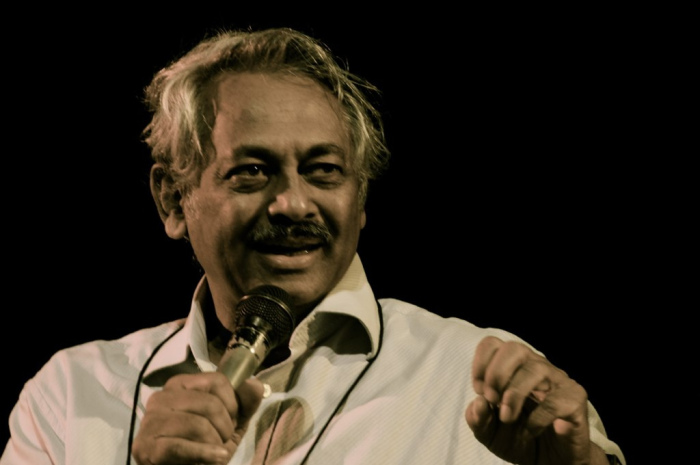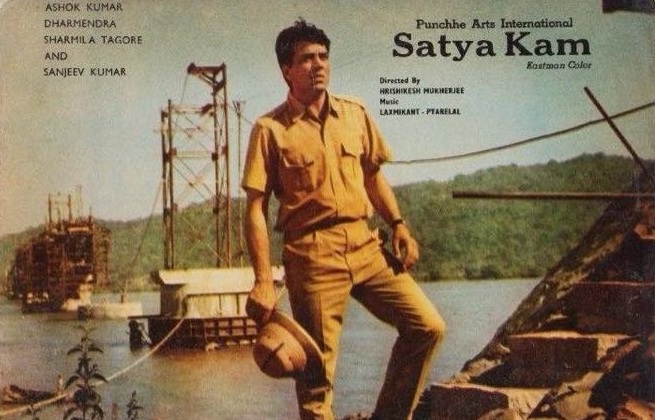The Academy Award winning movie Slumdog Millionaire, directed by Danny Boyle in 2008, had an important scene depicting the chaotic greeting given to Amitabh Bachchan by the dwellers of an old Bombay slum, which function as the movie’s backdrop. The protagonists, Jamal and his brother Salim managed to get an autograph of Bachchan, which Salil put for sale later. The scene is the first incident of Javed’s recollections of his past, which constitute the narrative of the movie. After the movie garnered critical acclaim and took its round all over the world, there were a number of articles rounding up the tributes and references in Slumdog Millionaire to Bollywood cinema of the 50s, 60s, and 70s. Besides the Amitabh Bachchan scene, there are many parallels to Bollywood narrative templates and character stereotypes; the predominant among them was Slumdog Millionaire’s allegiance with cult Bollywood flicks came out in the 70s, those high-voltage blockbusters that enjoy a cult following in the following years.
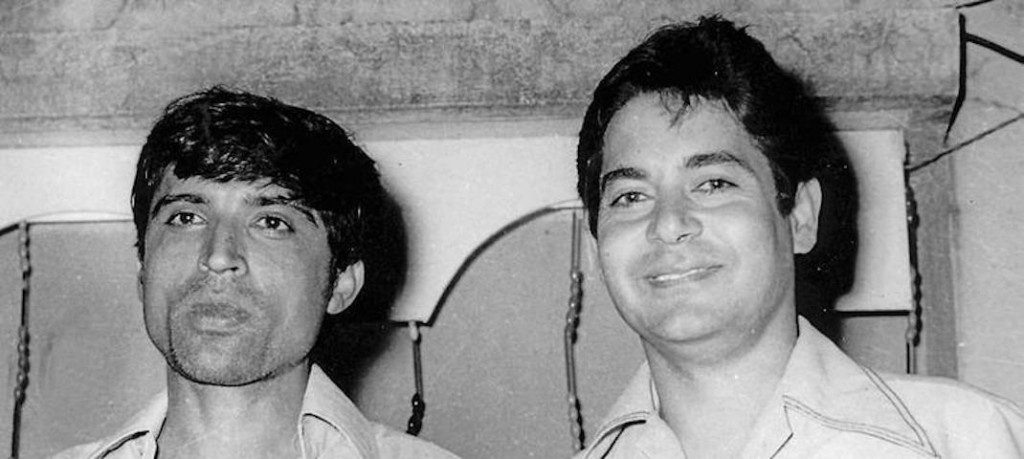
Slumdog Millionaire was also criticized for using clichéd elements of Bollywood flicks by some critics. But, what seemed as clichéd elements to them was deeply rooted and popular narrative conventions and plot devices in Indian mainstream cinema, and in that perspective, Slumdog Millionaire was a tribute to the Indian tradition of cinematic storytelling. Daany Boyle and his writer, Simon Beaufoy, were identifying the cultural elements that internalized in the moviegoers from the 70s and put them in a cross-cultural platform of international cinema. Most of their techniques and plot devises traced back the 70s Bollywood, an epoch when a screenwriter duo single-handedly redefined the narrative conventions of Indian cinema. They are Salim Khan and Javed Akhtar, who used the acronym Salim-Javed for nearly 26 films with almost all of them went on to blockbusters with a cult following.
Salim Khan and Javed Akhtar shook Bollywood in the 70s as screenwriters with their iconic characters like Inspector Vijay Khanna (Amitabh Bachchan, Zanjeer), Vijay Verma (Amitabh Bachchan, Deewar), Jai (Amitabh Bachchan, Sholay), Veeru (Dharmendra, Sholay), and Vijay Pal Singh (Amitabh Bachchan, Kaala Patthar). Bollywood was witnessing the birth of a new prototype, the angry young man, and a superstar, Amitabh Bachchan. Salim-Javed’s characters set ablaze the theaters and went on to become the representatives of a dissatisfied, depressed and violent middle-class youth. The country was going through turbulent times like Indo-Pak war, India’s first nuclear test, national emergency, derailed industrial production, shortages, unemployment, and an aggressive, disillusioned working class.
Amitabh Bachchan : The Blender of Perfect Combinations
The epoch was ripe for planting the angry young man prototype and Salim-Javed positioned their characters and plots exactly at the core of the melting pot and their explosive dialogues like, Jis tarah kuch aadmiyo ki kamzori baimaani hoti hai … is hi tarah kuch aadmiyo ki kamzori imaandari hoti hai (Just like some people have cheating as their weakness … just like that some people have honesty as their weakness), Joh haath angaare ko chupaye … angaara us hi haath ko jalaa deta hai (The hands who will hide the burning coal … the burning coal will burn the same hands), Main aaj bhi fenke hue paise nahi leta! (I don’t pick up money thrown at me, not even today! Don ka intezar toh gyarah mulkon ki police kar rahi hai. Lekin Soniya, ek baat samajh lo Don ko pakadna mushkil hi nahi, namumkin hai (Don is wanted by the police forces of eleven nations, but understand one thing Soniya, catching Don is not just difficult, it’s impossible), Jab tak baithne ko na kaha jaaye sharafat se khade raho. Yeh police station hai tumhare baap ka ghar nahi (Stand straight until you are told to sit … this is a police station … not your father’s house), and Vijay: Aaj mere paas paisa hai, bangla hai, gaadi hai, naukar hai, bank balance hai, aur tumhare paas kya hai?” Ravi: “Mere paas Maa hai! (Vijay:Today I have lots of money, a bungalow, a car, a servant, bank balance … what do you have? Ravi: I have my mother!), echoed in cinema halls all over the country.
Dharmendra –Superstar, Lost In Transition
The duo not only re-drew the storytelling in Bollywood but repositioned the stature of screenwriters in the filmmaking process. There was an insulting discrimination in the filmdom against writers and many talented writers weren’t paid the perquisites they deserved. Movies were revolved around stars, directors, and producers. But Salim-Javed positioned them as an ineluctable formula and insisted that the name should appear in the movie posters, a daring demand in those days where screenwriters were mostly invisible souls. After Salim-Javed scripts hit the industry with a bang, people started to look for the screenwriter’s name in the posters before queuing up for movies. The duo’s magical impact was so deep in the moviegoers that their movies were identified with the popular one-liners. Even though Salim Khan and Javed Akhtar were not the first talented wordsmiths in the game, but their output elated them as legends in coming years.
They liberated the writers from a superfluous existence of either associated with a filmmaker or a production house. There were outstanding writers like Khwaja Ahmad Abbas, who had collaborated with Raj Kapoor, Satish Bhatnagar affiliated with Sippy Films and Akhtar-ul-Iman and Rahi Masoom Raza worked for BR Films. Salim Khan and Javed Akhtar bombarded this hierarchy with confidence and their attitude made the difference; the screenwriters were not mere pen-pullers anymore.
Both Salim Khan and Javed Akhtar were born in Madhya Pradesh and to be acclaimed writers was a dream far from their ambitions, as both of them nurtured different designs for their lives. Salim Khan, who born and brought up in a prominent family in Indore, was an aspiring actor in his youth. Being a star cricketer and charismatic personality, Salim Khan was the local favorite and that prompted the young man to pursue a career in acting in Bollywood. Javed Akhtar was more lured by the poetic legacy of his parents, the famous Urdu poet Jan Nisar Akhtar and singer Safia Akhtar. During his early years in Gwalior and Lucknow, Javed Akhtar honed his lexicon and imageries. Both of them reached Bombay separately and struggled for the beginner’s luck until destiny crossed their paths one day. In the late 60s, a beginner’s life was not a cakewalk in Bollywood and the entry barriers were as strong as they are today. Salim Khan was swinging between small jobs in film production and minor roles, while Javed Akhtar was battling with the exhausting hierarchical order in the sets, starting from clapper boy to second or third assistant to the director.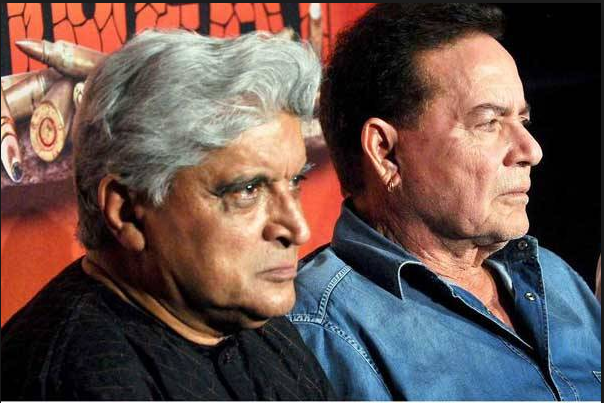
“I came here for acting. But, there are two things, art of projection and the art of acting. Both are very different and I didn’t have art of projection. I can conceive a role better than Dilip Kumar or Amitabh Bachchan and describe them what to do but, to project it myself on screen was not my way,” says Salim Khan about his short stint as an actor in an interview with journalist Indu Mirani. In another interview with Indu Mirani, Javed Akhtar reflects on those days, “There was nothing to write. But I was reading a lot. Like a chain smoker, I was a chain reader. There was a book with me all the time and I would manage to read it in local trains and the office where I worked as a clapper boy or third assistant. Reading takes your mind away from the fact that you have not eaten.” During those unfavorable and bleak days both the men meet up on the sets of the S. M. Sagar’s Sarhadi Lootera in 1966, in which Salim Khan was playing the second hero, and Javed Akhtar was a clapper boy-turned- temporary dialogue writer. The project was in a crisis when the original script writer hired by director S. M. Sagar walked out without a word and Salim Khan found out the young Javed Akhtar had come up with some really good stuff. Even though a probable partnership didn’t run through their minds at that time, both men found the other as a perfect partner to share their views on scripts, movies, industry, inequalities, struggles, fears, dreams and not least of all, an avalanche of story ideas.
The perils of being novices in Bollywood continue for them even after the Sarhadi Lootera days. Even though they managed to come up with fresh and original stuff in their respective fields, both of them were struck with professional setbacks one after another. Once again, S. M. Sagar intervened for the good and assigned them as writers for his next flick, Adhikar. The duo worked together on the script, dialogue, and lyrics, though the label “Salim-Javed” was yet to be evolved. “As a writer, he (Salim Khan) had the courage and I had the intricacy,” Javed Akhtar reflected on those days. They realized the epiphanic virtues of joining hands as a team and eventually ended up in the Screen Writing Department of Sippy Films as official screenwriters.
It was Ramesh Sippy’s idea to establish an exclusive screenwriting department for their production house, Sippy Films. Salim Khan, for his craftsmanship in creating plots and narratives, and Javed Akhtar, for his magical touch with dialogues, proved to be a deadly combo with their innovative script development techniques and brainstorming sessions. But, as employees of the writing department under the production company, their credits often went to the department or shared with more than one person who collaborated with them. Salim-Javed’s tryst with destiny happened when actor Rajesh Khanna, who had been flying high with a record of 17 consecutive box office hits at that time, impressed with the cockiness and the brilliance of the new writing pair, offered them their first full credits and payment for screenplay and dialogues. The movie was Haathi Mere Saathi which went on to become a blockbuster, adding another feather to Rajesh Khanna’s crown as master of the box office records.
Salim-Javed collaborated with Sippy Films even after the success of Haathi Mere Saathi and made Bollywood cash registers rang with money with movies like Seeta Aur Geeta, Sholay, and Don. Seeta Aur Geeta (1972) and Yaadon Ki Baaraat (1973) cemented the duo’s reputation as a sure bet in the box office and for the first time in Indian cinema, superstardom attributed to a pair of screenwriters was in the offing. When Zanjeer, directed and produced by Prakash Mehra, hit theaters in 1973, Salim Khan and Javed Akhtar catapulted into an iconic status and the power equations behind the camera were started to realign. Not only the movie landed Amitabh Bachchan in the cult angry young man role, it placed the duo in a bargaining and powerful position with the producers started displaying their name along with the makers on the movie poster. The zeal was so much that they even ventured into hiring a painter to stencil “Written by Salim-Javed” on the movie posters. As a true epiphany of the years to come, the painter even drew the tag line on the face of the major stars in the movie on the posters. Salim-Javed silenced the remaining hostile voices raised against placing them atop with the 1975 blockbuster, Deewar. The supremacy was well established and the message reached the power centers, the writer is no more a mere scribe and there was more to come!
In the same year, when Ramesh Sippy roped in Salim-Javed once again to pen his next flick, Indian cinema witnessed something unseen hitherto. Ramesh Sippy was looking for something grittier, a deviation from the glossy romantic melodrama trending in those days and the duo turned up with a western like, femme fatale, revenge drama titled Sholay. Upon release, Sholay trampled upon detrimental reviews of critics and with the help of intuitive and daring marketing strategies of the production house, went on to become one of the greatest blockbusters in the history of Indian cinema.
Sanjeev Kumar- An Actor Amongst The Stars, A Character Amongst Caricatures
Sholay was an epic in a number of ways, including an ensemble star cast of Dharmendra, Amitabh Bachchan, Sanjeev Kumar, Amjad Khan, Hema Malini, and Jaya Bhaduri and the well-sculpted script written by Salim-Javed. In his book, Written by Salim-Javed: The Story of Hindi Cinema’s Greatest Screenwriters, writer Diptakirti Chaudhuri digs deep into the writing and development process of the duo during the Sholay days. According to Diptakirti Chaudhuri, Salim Khan, and Javed Akhtar even paid from their own pockets for advertisements for the movie. Salim-Javed’s one-liners like “Jo dar gaya samjho mar gaya… (He who is afraid is dead) lingered on every lip and the posters of the movie read “the greatest story ever told”. A cult was in the making and there were two people in its core, Salim-Javed, because it was the story and script that decided the destiny of the movie and everyone knew that.
Salim-Javed continue their race with an accelerated pace and movies like Don, Immaan Dharam, Trishul, Kaala Patthar, Dostana, Shakti, and Zamana followed. Their reign as the most influential screenwriters of Bollywood lasted 26 films that include two Kannada movies. They also established a historic partnership with Amitabh Bachchan which gave rise to the eponymous character archetype, the angry young man. Amitabh Bachchan, who was deeply shaken and disheartened by the early setbacks at the box office, reinvented his mettle and place in the neck-to-neck competition with his contemporaries with roles like Vijay Verma in Deewar, Inspector Vijay Khanna in Zanjeer, Vijay Kumar in Shakti, Vijay Kumar in Trishul, Vijay/ Don in Don, and Captain Vijay in Kaala Patthar, all created by Salim-Javed duo. The youth of the nation solemnly identified with the Vijay character archetype in the backdrop of widespread disillusionment of nationalism and ideals prevailing the first and second decade after independence. Salim-Javed’s characters and their furious dialogues spoke for the lost generation of the 70s and, in a particular way, became the safety valve to vent their despair and dissatisfaction. One could locate a Salim-Javed character prototype on every street, trams, buses, factories, campuses, red light areas, footpaths, or bars.
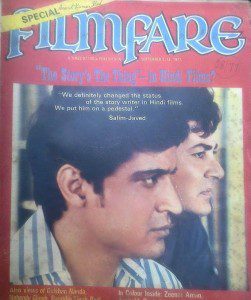
As they established their supremacy by the end of the 70s, both Salim Khan and Javed Akhtar garnered a considerable fan following and considered as two pillars of screenwriting history. At the zenith of their prime, cracks started to form between the unbreakable partnership and ironically, their partner in the crusade, Amitabh Bachchan’s name popped up in the friction. According to the book Yahi Rang Yahi Roop, which is written by journalist Anita Padhye, a difference in opinion between Salim Khan, Javed Akhtar and Amitabh Bachchan regarding the script of Mr. India, rooted the split and the misunderstanding followed led prompted legendary screenwriting pair to part ways. When asked about their historic spilt in an interview with Rajeev Masand, Salim Khan replied, “Every packet has an expiry date. It (the break up) happened a little prematurely. I think I could have handled it a better manner. When I looked back, I could have saved it.” In the same interview, Javed Akhtar observed the painful decision as “the fact that whatever good we had done, we had done together. And, if anything went wrong, that responsibility is also mutual.” While Javed Akhtar went on to Bollywood’s top notch lyricist after the split, Salim Khan continued to deliver well-crafted screenplays like Naam, Toofan, Patthar Ke Phool, and Mast Kalandar, and frequently collaborated with filmmakers like Mahesh Bhatt, Ramesh Sippy, Rahul Rawail, and Manmohan Desai.
Until Salim-Javed ventured into screenwriting, the majority of the movies and writers followed the storytelling tradition deeply rooted in the epic narrative in the nation. Story enjoyed the prominence in this mode and narrative had been often pushed to the back seat. Salim-Javed ruptured this system with detailed scripts specially written for filmmakers and pushed the plot and characterization into the driving seat. They picked up the clichéd storylines and build a strong plot with lively characters and had given detailed descriptions to the filmmakers for perfect execution of their cinematic blueprints. They also incorporated the dialogue writer’s role in the screenwriting process so that razor sharp dialogues could be developed alongside script as they know the plot inside out. Both Salim Khan and Javed Akhtar had an intuitive knowledge of the way in which Indian viewers perceive and react in a movie theater. They were thoroughly true to the characters and their emotions and made it a point of depicting their characters independent of pretentious moral dilemmas, allegiances to any political or philosophical dogma or fake artistic ambitions. Every Salim-Javed characters, even the legendary villains Gabbar Singh or Mogambo, was full of life and true to their personifications.
As a part of their crusade to make the screenwriter a crucial member of the filmmaking process, Salim-Javed reinvented and implemented certain plot devices and audio-visual techniques like squeezing time into montage sequences, intersecting and parallel timelines, brothers separated and rejoined with a touch of destiny, goal oriented protagonists, tricky flashbacks, and melodramatic twists of clichéd storylines. They had also placed the anti-hero archetype, which is driven by own rules and not bounded by any ideology other than willpower, in the limelight, in contrast to the submissive, idealistic and depressed hero of the Devdas era. Another brilliant move of Salim-Javed was the intermixing of genre defined by the western film scholars.
They fused together the characteristics of action, western, crime, adventure, romantic comedy, and melodrama into a single feature to create a hybrid form of entertainment to the viewers. The class contradictions were also played a crucial role the characterization of their urban proletarian hero with whom, the newly developed working class in the 70s identified their despair and rebel spirits with. Being aware of the formal conventions of Indian cinema as evenly distributed song and dance sequences with an intermission that functions as a fulcrum, Salim-Javed managed to create airtight screenplays that struck a chord with Indian viewers. In the interview with Rajeev Masand for CNN-IBN, Javed Akhtar sharply concludes their epic journey, “I think that what is important is until the time we were together we did some work which is relevant even today. We were the best till we were together and that will remain like that.”
Written By: Ragesh Dipu
© Bollywoodirect


